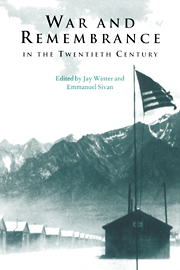Book contents
- Frontmatter
- Contents
- Preface
- Introduction
- 1 Setting the framework
- 2 Forms of kinship and remembrance in the aftermath of the Great War
- 3 War, death, and remembrance in Soviet Russia
- 4 Agents of memory: Spanish Civil War veterans and disabled soldiers
- 5 Children as war victims in postwar European cinema
- 6 From survivor to witness: voices from the Shoah
- 7 Landscapes of loss and remembrance: the case of Little Tokyo in Los Angeles
- 8 The Algerian War in French collective memory
- 9 Private pain and public remembrance in Israel
- 10 Personal narratives and commemoration
- 11 Against consolation: Walter Benjamin and the refusal to mourn
- Index
- Studies in the Social and Cultural History of Modern Warfare
2 - Forms of kinship and remembrance in the aftermath of the Great War
Published online by Cambridge University Press: 27 October 2009
- Frontmatter
- Contents
- Preface
- Introduction
- 1 Setting the framework
- 2 Forms of kinship and remembrance in the aftermath of the Great War
- 3 War, death, and remembrance in Soviet Russia
- 4 Agents of memory: Spanish Civil War veterans and disabled soldiers
- 5 Children as war victims in postwar European cinema
- 6 From survivor to witness: voices from the Shoah
- 7 Landscapes of loss and remembrance: the case of Little Tokyo in Los Angeles
- 8 The Algerian War in French collective memory
- 9 Private pain and public remembrance in Israel
- 10 Personal narratives and commemoration
- 11 Against consolation: Walter Benjamin and the refusal to mourn
- Index
- Studies in the Social and Cultural History of Modern Warfare
Summary
Agents of remembrance work in the borderlands linking families, civil society, and the state. There, during and after war, individuals and groups, mostly obscure, come together to do the work of remembrance. This entails their creating a space in which the story of their war, in its local, particular, parochial, familial forms, can be told and retold. The construction of the narrative – in stone, in ceremony, in other works and symbols – is itself the process of remembrance. Once completed in this initial phase, these ‘sites of remembrance’ are never stable, never fixed. In the process of composition, they begin to decompose, losing little by little the force and content of their original meaning and evocative power. The reason for this transformation is imbedded in the life cycle of agency itself. Those who join in this activity do so at the cost of other ventures; when their lives change, and other business calls, the bonds of such agency begin to fray, and unravel.
I would like to offer an interpretation of one facet of this process of public recollection of war in the twentieth century. I want to suggest that an antidote to the use of the term ‘collective memory’ in a general or ethereal sense, floating somewhere in the cultural atmosphere of a period, may be found in the insistence upon the significance of agency in the work of remembrance of particular groups of survivors, whose bond is social and experiential. Following anthropologists, these groups may be termed ‘fictive kin’, ‘adoptive kin’, or ‘functional kin’, as opposed to those linked by blood bonds or marriage.
- Type
- Chapter
- Information
- War and Remembrance in the Twentieth Century , pp. 40 - 60Publisher: Cambridge University PressPrint publication year: 1999
- 27
- Cited by



